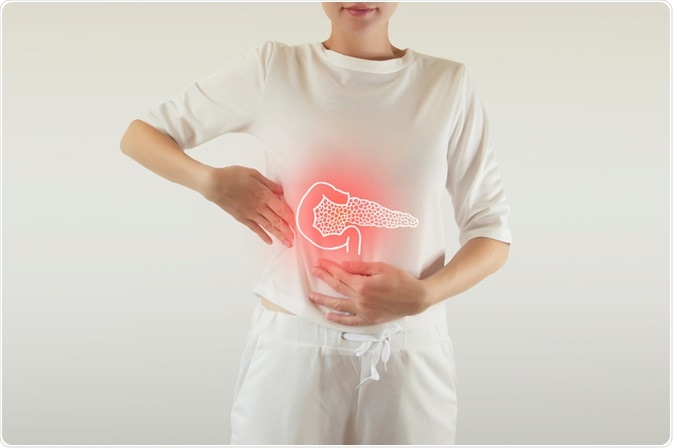Pancreatitis refers to inflammation of the pancreas, a long, leaf-shaped gland that lies in the upper abdomen, behind the stomach. This organ secretes powerful enzymes required for the digestion of carbohydrates, proteins, and fats. The pancreas also releases the hormones insulin and glucagon, which are needed to regulate the body’s blood sugar level.

Pancreatitis Concept. Image Credit: mi_viri/Shutterstock.com
Depending on how long a person has had pancreatitis, the condition may be “acute” or “chronic”. Acute pancreatitis refers to inflammation that causes short-term illness and is resolved relatively quickly. When the pancreas has become permanently damaged and causes ongoing illness, the condition is described as chronic.
In the UK, as many as 45,000 individuals are living with chronic pancreatitis and about 12,000 develop acute episodes of the illness every year. Pancreatitis affects more men than women.
Pancreatitis process
During normal digestion, inactive digestive enzymes move through ducts inside the pancreas towards the small intestine where they then become activated to aid digestion. In the case of pancreatitis, however, these enzymes become activated while they are still inside the pancreas.
The enzymes begin to attack the pancreatic tissue, leading to irritation and inflammation. Although these attacks are usually acute and can lead to life-threatening symptoms, the condition resolves in the majority of patients, and most recover completely.
However, recurrent bouts of acute pancreatitis can eventually lead to chronic inflammation and cause scarring and loss of function (chronic pancreatitis). This impaired pancreatic function can eventually lead to digestion disorders, malnutrition, and diabetes.
Often, the only way to differentiate between the acute and chronic forms of pancreatitis is through abdominal X-ray or other imaging techniques to detect scarred and damaged tissue in the pancreas.
Causes
The majority of pancreatitis cases are caused by gall tones or alcohol consumption. While gall stones generally cause acute pancreatitis, excess alcohol consumption is the most common cause of chronic pancreatitis.
Gallstones
Gallstones can cause acute pancreatitis to develop if they move out of the pancreas and block the organ’s opening. This can disrupt the usual function of digestive enzymes in the pancreas, which start to digest the pancreas instead of helping to digest food.
Alcohol
How alcohol leads to chronic pancreatitis is not fully understood, but it is thought that enzymes start to digest the pancreas due to interruption of normal pancreatic function.
Drinking a lot of alcohol over a short period or binge drinking is thought to increase the risk of acute pancreatitis and in cases where this is the underlying cause, continued drinking is the biggest risk factor for the development of tissue damage, scarring, and therefore chronic pancreatitis. Although, excessive drinking is the cause of chronic pancreatitis in 90% of cases, in some individuals, the cause of this condition is unknown and this is referred to as idiopathic pancreatitis.
Exocrine pancreatic failure
In cases of chronic disease, the pancreas may eventually stop producing the enzymes required for digestion, which can lead to malnutrition. This is referred to as exocrine pancreatitis. Poor digestion and absorption of fat and protein can cause weight loss and the passing of greasy or oily stools.
Endocrine pancreatic failure
In advanced cases of chronic pancreatitis, the organ may stop producing insulin, which is referred to as endocrine failure and can cause diabetes to develop.
Less common causes
While gallstones are estimated to account for around 45% of pancreatitis cases, alcohol for 35% and 10% are idiopathic, the remaining 10% of cases are due to other causes. Some of the other reasons that pancreatitis may develop are listed below.
- The use of certain medications such as corticosteroids, the HIV drug didanosine, valproic acid, the chemotherapy agent azathioprine, and the antihyperglycemic drug metformin.
- Hypertriglyceridemia, although the serum triglyceride level needs to be higher than 1000 mg/dl for a person to be at risk.
- Trauma or accidental pancreatic injury incurred during a procedure called endoscopic retrograde cholangiopancreatography (ERCP), which is used to remove gallstones or assess the pancreas.
- Viral infections such as mumps or measles.
- Diabetes increases the risk of pancreatitis developing by almost three times.
- A genetic mutation called MCP-1 mutation has also been identified as increasing the risk for severe acute pancreatitis by eight times compared with the general population.
- Cystic fibrosis
- Pancreas divisum, a congenital condition where the ducts in the pancreas do not function properly.
References
Further Reading
Last Updated: Jul 21, 2023